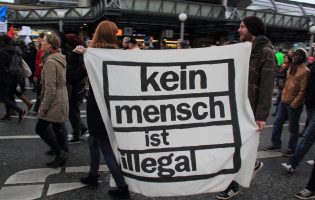It’s a Material World: Managing Metals and Critical Materials Against All Odds
On June 25, 2013, the AGI Business & Economics Program hosted a seminar on “It’s a Material World: Managing Metals and Critical Materials Against all Odds,” generously supported by the German Academic Exchange Service (DAAD). Prof. Dr. Raimund Bleischwitz, a current DAAD/AGI fellow, presented the findings from his research stay at AGI, focusing on transparency in the extractive industries. The audience consisted of a variety of industry, government, think-tank and non-profit representatives.
Although steps have already been taken to improve transparency in the extractive industries of oil, gas, and mining, the process still lacks a joint transatlantic approach. What countries like the U.S. and Germany, among others, have in common is their dependency on the reliable supply of materials to keep their energy systems and economies running. In an attempt to ensure global standards in the sector, the Extractive Industries Transparency Initiative (EITI) was founded as a coalition of governments, companies, investors, and international organizations. The EITI publishes reports in which government revenues and company payments are disclosed and independently assessed, thereby creating public awareness and debate on how to manage resources better. One of the main problems, however, is the absence of emerging economies. Another index, released by Revenue Watch in May 2013, measures the quality of governance in the oil, gas, and mining sectors of eighty-five countries. The results show the need for a determined move forward in increasing transparency: Of the eighty-five countries, only eleven have satisfactory resource governance. Whether the transparency initiatives are able to have a substantial impact remains unclear, especially in crisis regions like the Democratic Republic of the Congo.
One of Prof. Bleischwitz’s main recommendations is the need for an International Data Hub. This Data Hub should contain all the information available from many different sources, thus improving transparency. Furthermore, the Data Hub would be an important element in ensuring sustainable resource management as it openly reports the use of resources. His recommendations also included disclosing more financial transactions, and undertaking efforts to reach out to emerging economies. These short-term goals must be supplemented with the long-term goal of an international agreement on sustainable resource management.
The discussion showed a great interest in and need for exchange on this topic. Participants discussed a variety of interrelated questions including the possible impact of TTIP, the role of recycling, and possible implications for the environment. With regard to TTIP, Prof. Bleischwitz pointed out that potential agreement’s influence should not be overemphasized; rather, it is expected that U.S.-EU negotiations on transparency will result in longer-term standards that can later be adopted by other countries. Once more he and several other participants stressed the actual practicability by taking small but easily doable steps.






